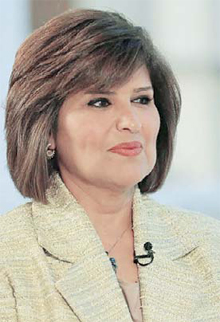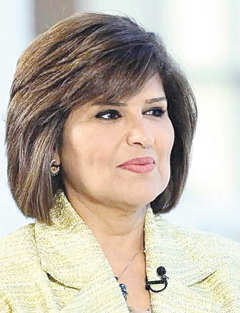Report calls for immediate activation of local tourism
 Nabila Al-Anjari
Nabila Al-AnjariKUWAIT: Kuwaitis' spending on short vacations abroad leads to draining their resources and savings, especially for families with limited income, a tourism specialist said. However, the lack of local recreational options forces most families to look for alternatives abroad, said Nabila Al-Anjari, General Manager of Leaders Group for Consulting and Development, representative of the World Tourism Organization in Kuwait.
Anjari's statements came in Leaders Group's monthly report released recently, and which includes suggestions for a number of 'immediate steps' that can help rationalize spending on tourism abroad in a way that goes in line with recent years' plans to cut down expenses in the aftermath of international economic crises and the fall of oil prices. The report said that the spending of both Kuwaitis and non-Kuwaitis on short vacations abroad has been increasing regardless of the drop in oil prices, which highlights the states' failure to cut down expenses through saving the endless amounts spent on those vacations.
Further, the report elaborated that citizens have spent huge amounts of money abroad during the first quarter of 2017. It also quoted Central Bank statistics showing that Kuwaitis' cash withdrawals abroad had increased by 4.9 percent in 2016 compared to 2015. In addition, World Bank's statistics showed that Kuwaitis have spent over $ 12 billion on foreign tourism in 2014, which is the year in which Kuwait and other Gulf Cooperation Council (GCC) states started cutting down expenditure after the drop in oil prices.
Notably, short vacations abroad, such as those during Eids, national holidays and weekends, have been consuming more funds compared to the long summer ones. Tourism experts assessed the total cash outflows from Kuwait during the 2013 Eid Al-Fitr holiday at KD 76.25 million.
Problem and solutions
Highlighting the amounts spent on foreign tourism is significant in many ways and is related to Kuwait's issuance of international bonds worth $10 billion by the end of March to cover deficits of the previous fiscal year, which had already reached KD 5 billion in January 2017, the report noted. It is also significant in preventing the parliament from passing a proposed bill on increasing fees of government-provided public services, adds the report.
Meanwhile, Leaders Group's research department has come up with many solutions, such as investing part of the sovereignty bonds issued by Kuwait, as well as a portion of the amounts allotted for investment in the 2018 budget in enhancing and activating local touristic and recreational sectors.
The report added that recreational sectors would attract various sects of Kuwaitis and expats, namely families, and would thus cut down the amounts they would spend on short vacations abroad. In addition, this could attract GCC families and expat families living in other GCC states to Kuwait. The report warned that although oil prices have revived by the end of 2017 and exceeded $60 per barrel, international oil prices are always changing. And in order to avoid reliance on a single source of income, the government should encourage investments in other sectors including local tourism with the aim of immediate reduction of citizens' spending on short vacations abroad.











